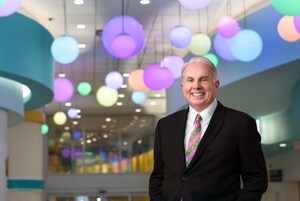Multi-center study led by Texas Children's Hospital and Baylor College of Medicine finds prenatal diagnosis and birth location may significantly improve neonatal HLHS survival
HOUSTON, Oct. 23, 2013 /PRNewswire-USNewswire/ -- A first-of-its-kind study led by Texas Children's Hospital and Baylor College of Medicine (BCM), published online in the journal, Circulation, found that infants with hypoplastic left heart syndrome (HLHS) born far from a hospital providing neonatal cardiac surgery for HLHS have increased neonatal mortality, with most deaths occurring before surgery. Researchers also concluded that efforts to improve prenatal diagnosis of HLHS and subsequent delivery near a large volume cardiac surgical center may significantly improve neonatal HLHS survival. For more information on the study, visit circ.ahajournals.org.
"Our study is the first to examine the interactions between prenatal diagnosis, birth location and cardiac surgical center volume to determine survival among infants with HLHS," said Dr. Shaine Morris, lead researcher, pediatric cardiologist at Texas Children's Hospital and assistant professor of pediatrics – cardiology at BCM. "These findings are essential to providing the most successful outcomes for our patients."
HLHS occurs when the fetus's left side of the heart does not develop normally, and is present in approximately 1 in 6,000 live births. HLHS is one of the most complex heart defects to treat because most of the structures on the left side of the heart are too small and underdeveloped – or hypoplastic – and it is difficult for the heart to provide enough red blood flow for the body's needs. The rate of mortality is quite high in HLHS, and optimal outcomes depend on aggressive cardiology and surgical management. All children with HLHS will have to undergo at least three surgeries within the first three years of life to survive, but many die in the first few months of life.
"Babies can be diagnosed with HLHS in-utero or after they are born," explained Dr. Daniel J. Penny, chief of cardiology at Texas Children's, professor and head of the section of cardiology in the department of pediatrics at BCM and contributing author on the study. "This study sheds light on delivery distance in addition to prenatal and postnatal diagnosis. If an infant is diagnosed after they are born, it is crucial that they are cared for at a center with expertise and high HLHS volumes."
The research, conducted by experts from BCM, the Texas Department of State Health Services, University of Texas Southwestern Medical Center in Dallas and the University of South Florida, used the Texas Department of State Health Services' Texas Birth Defects Registry data from 1999-2007 to retrospectively examine the associations between distance from birth center to a cardiac surgical center, number of newborns cared for with HLHS at each hospital, and neonatal mortality in infants with HLHS.
Of the more than 3.4 million births during the study period, 463 infants with HLHS were assessed. Mothers delivering farther from a cardiac surgical center were less educated and more often lived in a poverty-stricken area. Additionally, 39 percent of newborns studied were prenatally diagnosed with HLHS and delivered significantly closer to a cardiac surgical center. Forty percent of newborns with HLHS died that were born more than 90 minutes from a cardiac surgical center, compared to 21 percent of those born within 10 minutes of a surgical center. The percentage of patients that died after the first surgery for HLHS was two to four times higher in low volume surgical centers than in the highest volume centers. Overall, in the latest years of the study, newborns with a prenatal diagnosis, born less than 10 minutes from a cardiac surgical center, and cared for at a large volume cardiac surgical center, had a neonatal mortality of 6 percent. For those born in the same era without a prenatal diagnosis, more than 10 miles from a cardiac surgical center, and cared for at a low volume cardiac surgical center, 28-day mortality was 29 percent.
Texas Children's Heart Center is one of only ten cardiac surgical centers that offer the first surgery for HLHS in the state of Texas, and is one of the highest volume congenital heart surgery centers in the country. Additionally, the Heart Center works in close collaboration with Texas Children's Fetal Center at Texas Children's Pavilion for Women to identify and begin treatment of this complex heart issue in-utero. The Fetal Center is one of only a few centers in the world capable of performing complex fetal intervention as it involves a coordinated effort among a large, multidisciplinary team of fetal cardiologists, OBGYNs, interventional cardiologists, congenital heart surgeons, fetal imaging experts, maternal and fetal anesthesiologists and other clinical specialists.
"Previously, parents had limited options when they received an early diagnosis of HLHS during pregnancy," said Dr. Michael Belfort, obstetrician and gynecologist-in-chief at Texas Children's Hospital and chairman of obstetrics and gynecology at BCM. "Now, through the collaborative work of the Fetal and Heart Centers at Texas Children's Pavilion for Women, families have more options and we are seeing even better outcomes for these babies."
For more than 50 years, Texas Children's Heart Center has cared for children with congenital heart defects, like HLHS, and treats more than 17,000 children and performs more than 800 surgeries annually.
"If you're able to deliver at or near a high volume cardiac surgical center, you're likely to have the best outcome for your child," added Morris. "Our multidisciplinary team has the expertise to care for fetuses in-utero all the way into adulthood."
Texas Children's Heart Center is committed to consistently providing outcomes that are among the best in the nation. As part of this commitment, Texas Children's has a dedicated Surgical Outcomes Center devoted to patients and families through a commitment to track and improve clinical outcomes, transparency in sharing those outcomes and advocating for care to be provided where the best outcomes can be achieved.
About Texas Children's Hospital
Texas Children's Hospital, a not-for-profit organization, is committed to creating a community of healthy children through excellence in patient care, education and research. Consistently ranked among the top children's hospitals in the nation, Texas Children's has recognized Centers of Excellence in multiple pediatric subspecialties including the Cancer and Heart Centers, and operates the largest primary pediatric care network in the country. Texas Children's has completed a $1.5 billion expansion, which includes the Jan and Dan Duncan Neurological Research Institute; Texas Children's Pavilion for Women, a comprehensive obstetrics/gynecology facility focusing on high-risk births; and Texas Children's Hospital West Campus, a community hospital in suburban West Houston. For more information on Texas Children's, go to www.texaschildrens.org. Get the latest news from Texas Children's by visiting the online newsroom and on Twitter at twitter.com/texaschildrens.
About Baylor College of Medicine
Baylor College of Medicine (www.bcm.edu) in Houston is recognized as a premier academic health science center and is known for excellence in education, research and patient care. It is the only private medical school in the greater southwest and is ranked as one of the top 20 medical schools for research in the country and number one in Texas by U.S. News & World Report. BCM is listed 17th among all U.S. medical schools for National Institutes of Health funding, and No. 2 in the nation in federal funding for research and development in the biological sciences at universities and colleges by the National Science Foundation. Located in the Texas Medical Center, BCM has affiliations with nine teaching hospitals. Currently, BCM trains more than 3,000 medical, graduate, nurse anesthesia, and physician assistant students, as well as residents and post-doctoral fellows. Follow Baylor College of Medicine on facebook (http://www.facebook.com/BaylorCollegeOfMedicine) and twitter (http://twitter.com/BCMHouston).
Contact: Lindsey Fox
832-824-2040
[email protected]
SOURCE Texas Children's Hospital
WANT YOUR COMPANY'S NEWS FEATURED ON PRNEWSWIRE.COM?
Newsrooms &
Influencers
Digital Media
Outlets
Journalists
Opted In






Share this article